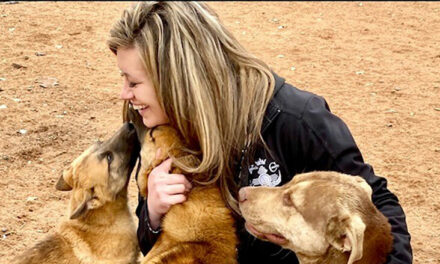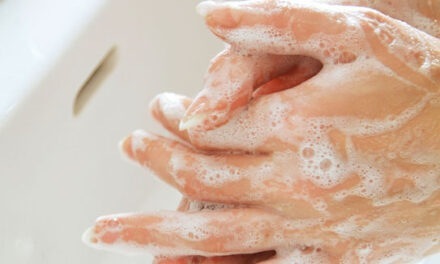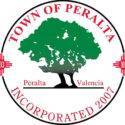BELEN — As life has become more complicated and regulated due to the ongoing public health crisis of the novel coronavirus pandemic, so too have the rituals of death.
With COVID-19 a daily presence, local funeral homes and families have had to change how they perform this final act.
Rick Griego and his siblings buried their father, Aniceto Griego, on April 3 in the cemetery in Las Nutrias. What to do if he died during the pandemic was something Griego and his brother had talked about.
“Do the best we can is what it came down to, quite honestly,” Griego said.
With six children traveling from different states with varying travel restrictions, Griego knew the funeral for his father wouldn’t be everything they hoped for.
“I’m in California, which is a lot more strict. You have to be an essential worker to leave the house and have a permit to drive, which I happen to be,” Griego said.
He drove 700 miles and arrived in Belen the night of his father’s Rosary. The burial was the next day and within 24 hours, he was home again.
“It was a bummer we couldn’t have a good celebration,” he said. “But there were a couple of things to consider. No. 1 was the virus and a lot of restrictions. No. 2, and more important, Dad was 86 and so were a lot of his friends. We didn’t want to expose them, so we took it nice and easy.”
Only three or four people were at the graveside itself with the rest of the mourners spread out, staying 6 feet apart.
“Those were the negatives, but there were some positives,” Griego said.
Since many friends and family members couldn’t attend, he used Facetime to include them. The funeral home, Romero Funeral Home, recorded the service and put it online so people could watch later.
“You work with what you got. Romeros went the extra mile as far as I’m concerned to do everything possible to make a bad situation as pleasant as possible,” Griego said. “We will schedule a celebration of life party when we can. And since we’re doing it a little later, it will be more that we’re having a celebration and not a wake.”
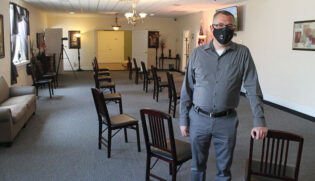
At the Noblin Funeral Service Belen chapel, owner and funeral director Robert Noblin arranges chairs six-feet apart to allow for properly social distancing during viewings.
Julia M. Dendinger | News-Bulletin photo
Social distancing — staying 6 feet away from people who aren’t household members — is the No. 1 measure taken by both Romero Funeral Home and Noblin Funeral Service.
“We really promote social distancing,” said Romero funeral director and owner Dicky Romero. “We ask people to adhere to the six feet. Once we do that, I feel our job is done. They are grieving. How do you tell people not to hug? It’s tough.”
Early on in the pandemic, both funeral homes had to limit viewings and services to five people at a time, but two weeks ago, they were able to increase that amount to 25 percent of their capacity, the same as churches and houses of worship.
“Limiting the number of people allowed in, having them wait 6 feet apart, it worked. And it’s not at all normal,” said Robert Noblin, owner and director of Noblin Funeral Service. “This is a time when people want to be all together and grieve together.”
Both locations have signs reminding people to remain 6 feet apart, and Noblin has signs he places on the sidewalk as people wait to come in for a viewing.
“The state board of funeral service has made it very clear — it can’t hold the public accountable but it can certainly hold the funeral home or director accountable for violating orders and putting the public at risk,” Noblin said.
Funeral arrangements for the first county resident whose death was COVID-19 related were handled by Romero Funeral Home. She died at an Albuquerque hospital, so Romero sought guidance from staff there, which was in short supply.
“I talked to five different people. No one knew what I was supposed to do, how to handle this,” Romero said.
Left to “play it by ear,” Romero took a casket with a body bag inside to the hospital. He took the casket directly to the hospital’s morgue and disinfected it after the body was inside. From there, he went directly to the cemetery where the woman would be buried.
Staff there took the casket out of Romero’s hearse and put it in their own vehicle, he said. It was taken to the gravesite, where family members were allowed to stand outside their cars at a distance to witness the burial.
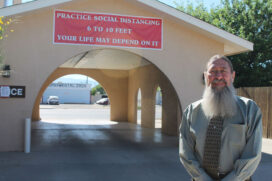
Visitors to Romero Funeral Home are reminded to keep a proper social distance from one another by various signs and funeral director and owner Dicky Romero.
Julia M. Dendinger | News-Bulletin photo
Noblin Funeral Service has changed not only how it performs services for families and loved ones, but also how a body is brought to the funeral home.
When the call comes in, there are additional questions — has the person tested positive for COVID-19? Have they exhibited symptoms of the disease?
“When our staff arrives at the home, nursing facility or hospital, we wear face masks and use disinfectant sprays. We place the deceased into a body pouch whereas under normal circumstances, especially if the family is present, we would put the person on a gurney and simply cover them with a sheet,” Noblin said.
There is also a separate area where individuals who have tested positive for the disease or died due to COVID-19 related complications can be kept at the funeral home.
When preparing a deceased person for a viewing and funeral, Noblin said those processes are all done as per OSHA regulations and universal precautions.
“We treat every person as if they have COVID-19 or HIV or hepatitis or Creutzfeldt-Jakob disease,” he said. “There have been cases where funeral professionals have prepared the deceased and done a COVID-19 test a week, two weeks after and gotten a positive.
“It’s not 100 percent of the time but it has happened. That’s the reason we use face masks and cover the face of the deceased; in moving them we wouldn’t want droplets to leave their lungs.”
Those things might sound cold and dehumanizing, but Noblin says they are critical, especially now.
“What I always say is the foundation of funeral service is public health and safety,” he said. “If we don’t adhere to orders then I think we are failing miserably at our basic purpose. We’ve had to really strive to accommodate family’s wishes while accommodating the reality of COVID-19 and their safety.”
Everything from sanitized pens to sign the guest book to an investment in audio visual equipment to live-stream and webcast funerals and viewings have been done, Noblin said.
“This is a huge change in the way things are done. What people deserve, are accustomed to and what they feel they need when a loved one dies, they can’t do now,” he said. “We are seeing a lot of what I’d call delayed grief. People are not able to display and share that emotion with other family members and friends like they normally would.”
After the sudden death of her husband in early May, Eileen Jaramillo said the restrictions on large gatherings might have been a bit divine.
“I’m not much of a public person, but Jeremy had such a presence,” Jaramillo said. “We will have a memorial for him later and it’s going to be beautiful. I think I will be stronger and more composed.”
The public viewing for Jeremy Jaramillo, a youth coach known from Belen to Albuquerque, drew nearly 200 people to Noblin’s Belen chapel, Jaramillo said.
“But they were spaced out four or five at a time. I was on my feet for four hours but I had time with family members and players and coaches, people telling about all the fun times coaching with him, about him mentoring kids without dads. I think, under the circumstances, it was really a blessing.
“People go through such pain and suffering. By extending this, I feel like there will be time for myself and the children to gather our composure. The experience was as gentle as it could have been.”
Julia M. Dendinger began working at the VCNB in 2006. She covers Valencia County government, Belen Consolidated Schools and the village of Bosque Farms. She is a member of the Society of Professional Journalists Rio Grande chapter’s board of directors.


